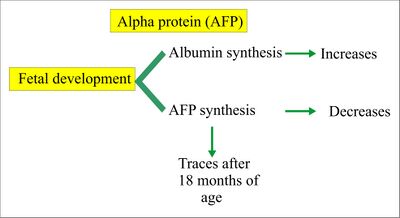Alpha-fetoprotein
Alpha-fetoprotein (AFP, α-fetoprotein) is the major plasma protein produced by the yolk sac and fetal liver. It is also referred to as fetal albumin because of the similarity of its structure to albumins. After birth, its level in the serum of the newborn decreases rapidly.
It is physiologically elevated in pregnancy (up to 500 μg/l). The rise is further accompanied by pathological conditions associated with liver involvement, especially active hepatitis and cirrhosis.
Normal values in adults is <10 μg/l.
AFP is used as a tumor marker in nonseminomas and other germ cell tumors (testicular tumors, ovarian tumors, teratoma) and in hepatocellular carcinoma (hCC) where the sensitivity is up to 95% - screening in high-risk groups (cirrhotics, hepatitis B, etc.) and hepatoblastoma (the most common malignant liver tumour in children) is being considered.
Sources[edit | edit source]
Related articles[edit | edit source]
Bibliography[edit | edit source]
- SCHNEIDERKA, Petr. Kapitoly z klinické biochemie. - edition. Karolinum, 2004. pp. 365. ISBN 9788024606781.

